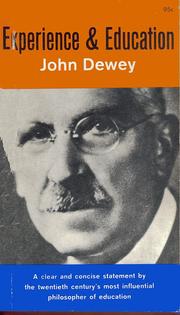Experience and Education (book)

1963 edition by Collier Books, NY
|
|
| Author | John Dewey |
|---|---|
| Country | United States |
| Language | English |
| Subject | Education |
| Publisher | Kappa Delta Pi |
|
Publication date
|
1938 |
| Media type | Print (Hardcover and Paperback) |
| Pages | 91 |
| ISBN | |
Experience and Education is a short book written in 1938 by John Dewey, a pre-eminent educational theorist of the 20th century. It provides a concise and powerful analysis of education. In this and his other writings on education, Dewey continually emphasizes experience, experiment, purposeful learning, freedom, and other concepts of progressive education. Dewey argues that the quality of an educational experience is critical and stresses the importance of the social and interactive processes of learning.
Dewey was critical of both traditional and progressive education, that is he saw challenges within both educational approaches because they lacked a carefully developed philosophy of experience. Dewey's progressive learning theory is based on the idea that people, even young people, are not just blank slates waiting to be filled with knowledge from kinder through college. Instead, Dewey suggested that students organize fact-based comprehension through meta-cognition, or by building onto prior experiences, preconceptions, and knowledge, and therefore, the educator's role is in creating an educative experience.
Experience and Education opens by saying that humans organize thoughts, and ideas as "either-ors" and argues that this is mirrored in educational philosophy, namely in what Dewey labels as traditional vs. progressive education. Dewey conceptualizes education as being focused on bodies of information and skills that are passed from one generation to another. Dewey does not pit traditional vs. progressive education against each other; instead, he is critical of teaching methods that are "static" and not incorporating enough experiential learning, which he notes young learners are more accustomed to. In addition, Dewey is critical of the old structure and its organization of educational philosophy.
In Chapter 2, The Need of a Theory of Experience, Dewey argues that not all experiences are educative and that, in fact, some experiences can be mis-educative. The central challenge to experience-based learning is to create fruitful experiences and organize them in progression to guide students’ learning. A mis-educative experience stymies the growth of further experiences. Enjoyable experiences may be mis-educative if they are disconnected and promote dispersive, disintegrated and centrifugal habits. In traditional schools, people associated boredom with the learning process. The experiences had by teachers and students were of the “wrong kind.” It Is not the absence of experiences in traditional schooling that Dewey finds troubling, but the defective nature of these experiences. Therefore, the educator’s duty is to determine the quality of an experience. Each experience has two aspects: the immediate agreeableness or disagreeableness and its later impact on further experience. Educators must think about the experiential continuum—continuity of experiences.
...
Wikipedia
